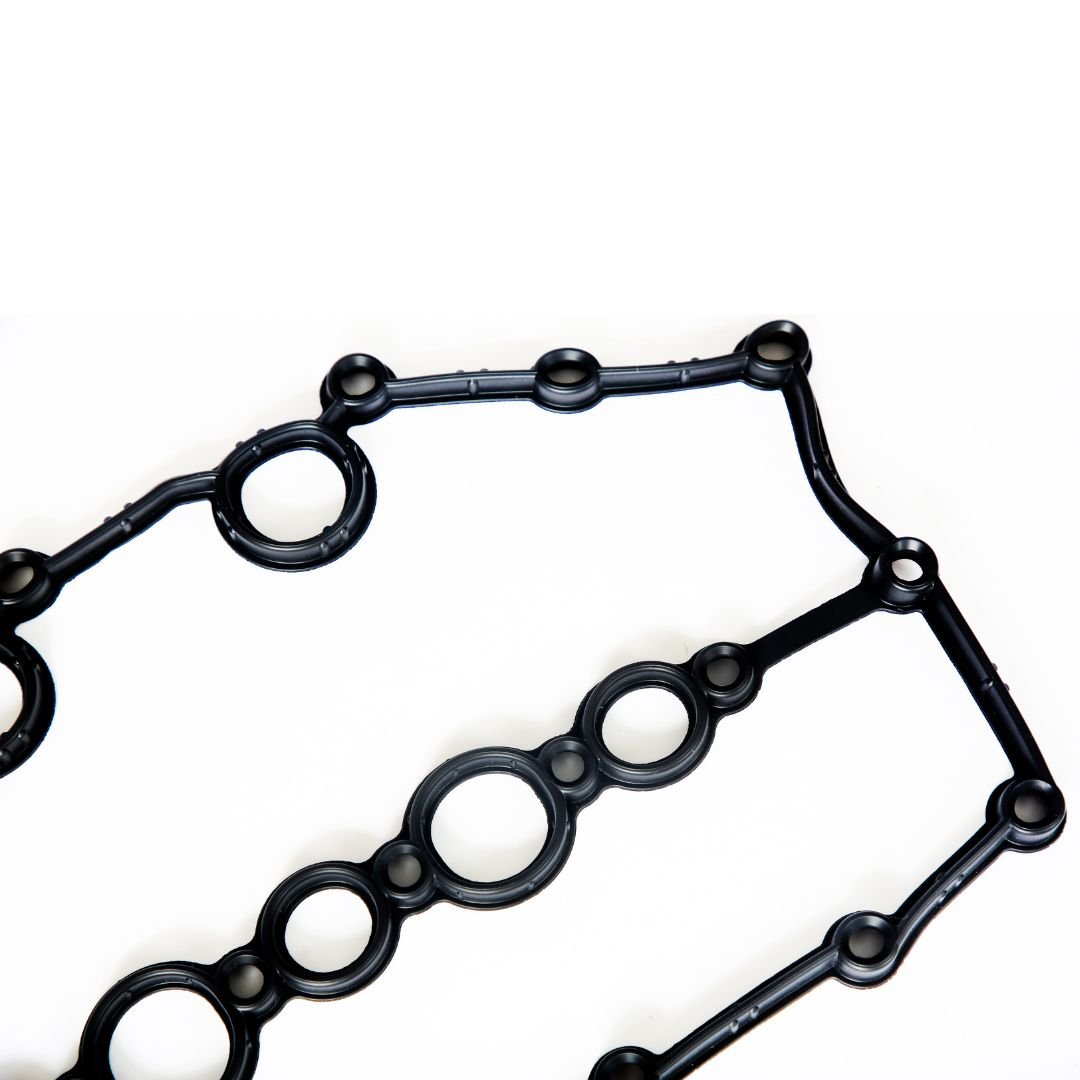PIP Gaskets for Automotive Manufacturing
In the automotive industry, gaskets are critical in ensuring proper sealing between components, preventing leaks, and maintaining the integrity of various systems. One type of gasket that has gained significant popularity is the elastomer Press-In-Place (PIP) gasket. Here we will explore the definition, application, benefits, and advantages of PIP gaskets and list typical high-performance elastomer types used in automotive PIP gaskets.
Close-up Detail of cam cover PIP Seal
Automotive Applications for PIP Gaskets
Elastomer PIP automotive gaskets are specialized sealing solutions designed to provide effective sealing under challenging conditions in automotive applications. These gaskets are typically made of elastomeric materials, commonly known as rubber, which exhibit excellent elasticity, resilience, and chemical resistance.
The primary application of elastomer PIP gaskets in the automotive industry is to ensure leak-free seals between mating surfaces. These gaskets are used in various automotive systems, including engines, transmissions, powertrain components, fuel systems, and cooling systems. Their ability to create a reliable seal helps prevent the leakage of fluids, gases, and other substances, ensuring optimal performance and longevity of automotive systems.
PIP Thermostat Seal
Benefits and Advantages of PIP Gaskets
Easy Installation: Elastomer PIP gaskets are designed for press-in-place installation, eliminating the need for additional adhesives or sealants. This feature simplifies the assembly process, reducing production time and costs.
Customizable and Versatile: PIP gaskets can be customized to fit various complex geometries and irregular surfaces. This versatility allows manufacturers to create tailored gasket designs for specific automotive applications, ensuring optimal sealing performance.
Enhanced Sealing Performance: Elastomer PIP gaskets offer excellent sealing capabilities, even in demanding environments with high temperatures, pressures, and chemical exposure. With the appropriately chosen elastomer type, they provide resistance against oil, fuels, solvents, coolant, and other automotive fluids, preventing leaks and maintaining system integrity.
Vibration and Noise Damping: PIP gaskets made of elastomeric materials possess inherent vibration and noise-damping properties. They help reduce vibrations and noise transmission between components, improving overall comfort and reducing noise.
Cost-Effective Solution: The ease of installation and versatility of PIP gaskets translate into cost savings for manufacturers. Reduced assembly time, elimination of additional sealants, and customized designs improve production efficiency and overall cost-effectiveness.
PIP intake manifold seal made from green FKM rubber
Typical High-Performance Elastomers Used for Automotive PIP Gaskets
Fluorocarbon (FKM): Fluorocarbon elastomers exhibit exceptional resistance to heat, chemicals, and fuels, making them suitable for high-temperature automotive applications. They provide excellent sealing performance in harsh environments and offer long-term durability.
Nitrile (NBR & HNBR): Nitrile rubber is widely used in automotive PIP gaskets due to its excellent resistance to oils, fuels, and solvents. It offers good mechanical properties, including flexibility and compression set resistance, making it suitable for various automotive applications. Hydrogenated Nitrile (HNBR) increases heat and chemical resistance beyond standard NBR.
Polyacrylic (ACM): Polyacrylic rubber, also known as acrylic rubber, exhibits excellent heat resistance and sealing performance. It provides good resistance to oils, fuels, and chemicals. ACM is commonly used in automotive PIP gaskets that operate in high-temperature environments and require superior sealing properties.
Ethylene Propylene (EPDM): EPDM rubber is commonly used for automotive gaskets due to its excellent weather resistance and good sealing properties. It provides resistance against ozone, weathering, and water, making it suitable for door seals, window seals, and weatherstripping applications.
Ethylene Acrylic (AEM): Ethylene acrylic rubber combines the properties of ethylene propylene rubber (EPDM) and acrylic rubber (ACM). It offers excellent heat resistance, oil resistance, and improved sealing performance. AEM is suitable for automotive PIP gaskets used in applications that require resistance to heat and oil exposure
Press-in-place side cover gasket manufactured with AEM rubber
Silicone (VMQ): Silicone rubber is known for its wide temperature range capability, from extremely low to high temperatures. It offers good resistance to UV radiation, ozone, and aging, making it suitable for automotive PIP gaskets in outdoor applications or areas exposed to sunlight.
By utilizing these high-performance elastomers, elastomer PIP gaskets offer reliable sealing solutions for a wide range of automotive applications. The choice of elastomer depends on the application's specific requirements, including temperature, chemical exposure, and sealing performance. Manufacturers can select the appropriate elastomer to ensure optimal performance and durability of automotive systems.
Conclusion
At Morgan Polymer Seals, we have over 25 years of experience in using high-performance elastomers such as FKM, HNBR, and ACM. Paired with high-quality manufacturing and vision inspection, the PIP gaskets we develop for our OEM customers offer excellent resistance to chemicals, temperature extremes, and environmental factors. Do you have a program you'd like help with? Click below and a product specialist will reply immediately.
Video: Injection Molding PIP gaskets in Mexico





